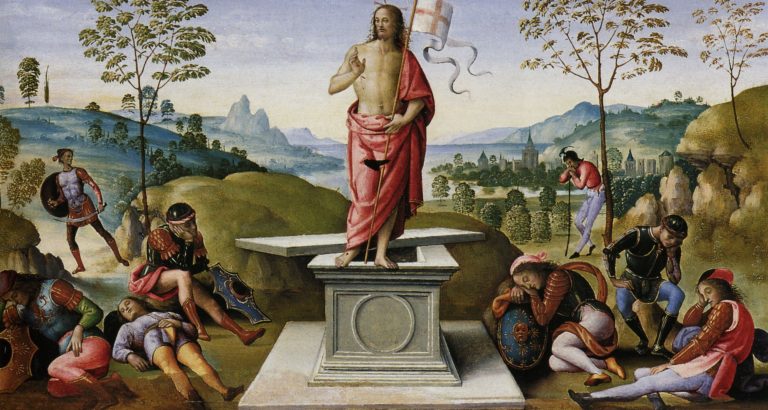Articles
> What to Do After Lent: Practical Tips from the…
What to Do After Lent: Practical Tips from the Church Fathers
By Mike Aquilina [social-share]
Mike Aquilina is the award-winning author of more than fifty books on Catholic history, doctrine, and devotion. He is executive vice-president of the St. Paul Center for Biblical Theology and a contributing editor to Angelus News.

What can we do differently or better now that we know the Fathers? What can we learn from them? Here are a few things that I’ve learned and that I try to keep in mind in my own work and witness, with my family, in the neighborhood, and in the Church. Here are some very practical steps.
- LOVE WHAT’S GOOD IN THE CULTURE. St. Justin Martyr looked for “seeds of the Word” everywhere in the world—in culture and in current thought. We too should look for the places where we can meet people, affirm the good they do, and draw them closer to Christ. St. Justin also said that everything good is already ours. It already belongs to the one God, who is the Lord of all creation.
- ISSUE A MORAL CHALLENGE. It’s not enough for us to accentuate the positive. We must also reject the things that are sinful. The Fathers did not convert the Roman Empire by compromising with pagan morals. They spoke out against abortion, contraception, divorce, and the unjust use of military force. They brought an end to the culture of death by enabling the culture to become something better. With God’s grace, we can do the same today.
- USE THE MEDIA YOU HAVE. The Fathers didn’t have much in the way of technology, but they used whatever they had. They wrote letters and poems. They wrote songs that taught doctrine and told Bible stories. They commissioned great artworks. But they also inscribed symbols of the Faith—a fish, a boat, an anchor—on common household items. They traveled. They preached. Today we have electronic media, not to mention good, old-fashioned books. Be creative.
- BRING THE FATHERS INTO YOUR PRAYER AND STUDY. Read them. Read about them. If life allows you the privilege, make pilgrimage to the places where they walked. We live in a time when so much is available to us. St. Thomas Aquinas said he would trade all of Paris for a single volume of Chrysostom. We have hundreds of works by Chrysostom for free online—plus all the other ancient writers— and there are many accessible, popular books to help us learn from and pray with the Church’s Fathers and Mothers.
- BRING THE FATHERS INTO YOUR TEACHING. Share the things that excite you. Your excitement will be communicable. Show the icons. Read passages—but keep them short. Use some of the documentaries, graphic novels, movies, and even animated features that have featured the early Christians.
- TEACH LIKE THE FATHERS. Put sacraments at the center. Non-Catholics may not understand these mysteries of faith, but when we speak to our ownpeoplewe should remind them what God has done for them. Through baptism and Eucharist, they have become “partakers of the divine nature”—children of God in the eternal Son of God. St. Basil said that the moment of baptism extends through the entirety of life. Let’s never forget that! Around AD 190, St. Irenaeus said: “Our way of thinking is attuned to the Eucharist, and the Eucharist in turn confirms our way of thinking.” For us as for the Fathers, the sacraments are the key to everything.
- CELEBRATE THE SEASONS. The Church’s calendar is the most effective catechism. It tells the story of salvation over and over again, through the beauty of the feasts and fasts. Every day is a new and different chance to teach the Good News, to deliver a bit of doctrine, and to lead people in the ways of prayer.
- PONDER THE GREAT MARVELS OF THE TRINITY AND THE INCARNATION. Read the Gospels and creeds with the ancient commentaries. See the difference Jesus made in your life and in human history. Don’t let these stunning realities become worn coin. Try to catch the mania for doctrine that Gregory of Nyssa found tiresome in his day. We can use a bit of it today! Remember: the ancients were prepared to die or be exiled for small points of the creed. We should love the Faith so well. But we cannot love what we do not know.
- KEEP YOUR SENSE OF HUMOR. God’s in charge, and we already know that the story ends well. As a result, St. Irenaeus could leaven his serious criticism of heresies with hilarious satire. St. Gregory of Nyssa could write a funny and winsome fundraising letter. St. Lawrence the deacon could look up from the gridiron at his executioner and say, “Turn me over. I’m done on this side.” Humor can be a sign of hope. And happy Christians proclaim an attractive faith.
- SEEK THEIR INTERCESSION. The Faith of our Fathers is living still, but so are the men and women who kept that faith. They are saints whose intercession we should seek. They accomplished great things in their allotted time on earth. They can do still more now, for our lives in the Church they love.
So we go to St. Justin, St. Irenaeus, St. Perpetua, St. Hippolytus, St. Cyprian, St. Athanasius, St. Macrina, St. Basil, St. Jerome, St. Augustine . . . and we say: pray for us!













